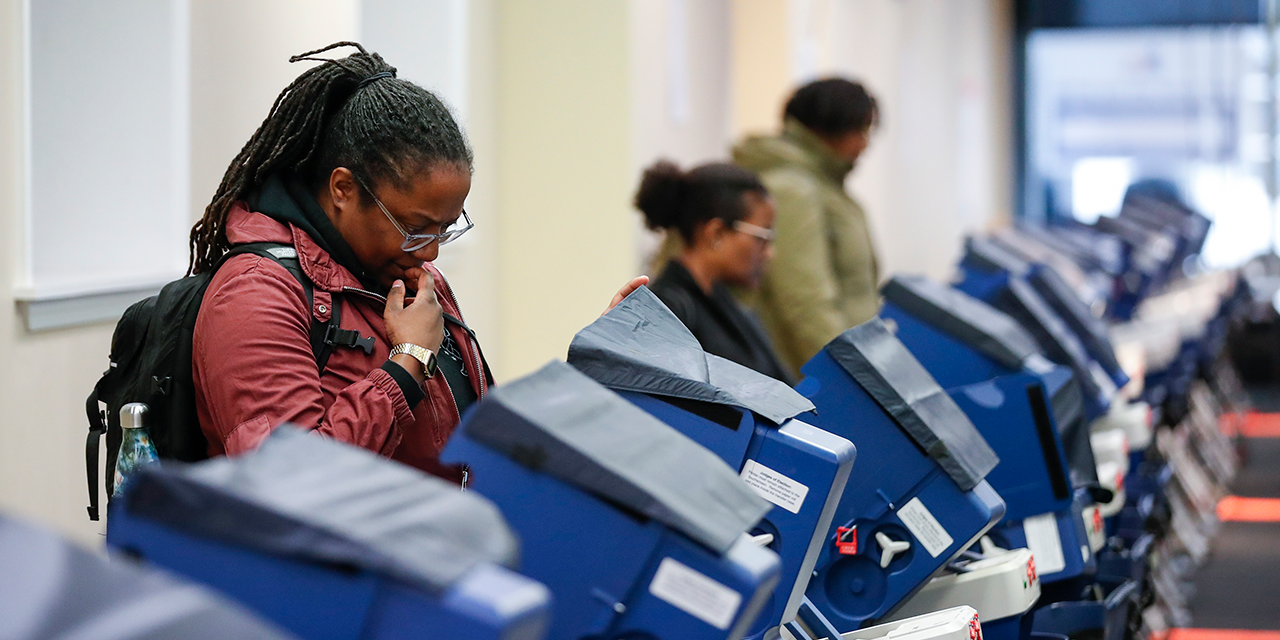Black voters are more confident in Biden than Trump when it comes to having the qualities needed to serve another term
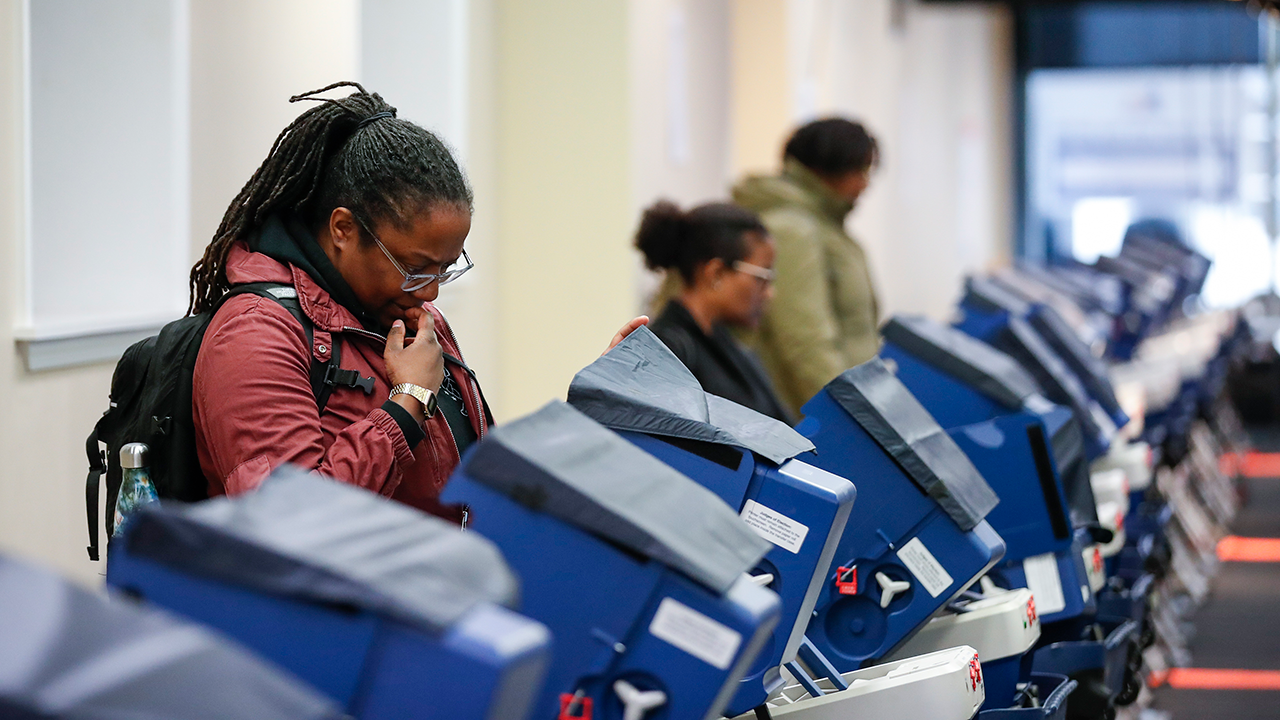
How we did this
Pew Research Center has a long history of conducting surveys that examine the views of American voters. This analysis of Black voters’ views on political party affiliation, policy priorities and 2024 presidential candidates relies on data from four of these studies.
The first of these studies was conducted among 5,140 adults from Jan. 16 to 21, 2024, on Pew Research Center’s American Trends Panel (ATP). There were 759 Black adults in the sample, which included an oversample of non-Hispanic Black men. This survey provided the data on Black voters’ views on domestic policy priorities discussed in this report. For more information on this study, see its methodology and questionnaire.
The second was conducted among 3,600 adults from April 1 to 7, 2024, on the Center’s ATP. There were 611 Black adults in the sample, which included an oversample of non-Hispanic Black men. This survey provided the data on Black voters’ views on foreign policy priorities discussed in this report. For more information on this study, see its methodology and questionnaire.
The third used annual totals of data from Pew Research Center telephone surveys (1994-2018) and online surveys (2019-2023) among registered voters. All telephone survey data was adjusted to account for differences in how people respond to surveys on the telephone compared with online surveys. All online survey data was drawn from the Center’s ATP. This combination of surveys provided the data for Black voters’ political party affiliation trends. For more information on this study, see its methodology and the full report. Read more on how we adjusted for mode effects when combining telephone and online surveys.
The fourth was conducted among 8,709 adults from April 8 to 14, 2024, on the Center’s ATP. There was an oversample of non-Hispanic Black adults, for a total of 1,372 Black adults in the sample. This survey provided the data on Black voters’ views on Joe Biden, Donald Trump and the 2024 presidential election discussed in this report. For more information on this study, see its methodology and questionnaire.
Terminology
The terms Black Americans and Black adults are used interchangeably throughout this report to refer to U.S. adults who self-identify as single-race Black and say they have no Hispanic background.
Black Americans include those who are registered to vote, not registered or are unsure. Discussions and charts limited to registered voters will be labeled as such and they will be referred to as Black voters.
Democrats and Democratic leaners are respondents who identify politically with the Democratic Party or who identify politically as independent or with some other party but lean toward the Democratic Party.
Republicans and Republican leaners are respondents who identify politically with the Republican Party or who identify politically as independent or with some other party but lean toward the Republican Party.
(In later uses, the terms Democrat and Republican are inclusive of those who lean to each party.)
Black voters will play a key role in determining the outcome of the 2024 presidential election. And while Black voters remain overwhelmingly Democratic and support Joe Biden over Donald Trump by a wide margin, Biden’s advantage among this group is not as wide as it was four years ago.
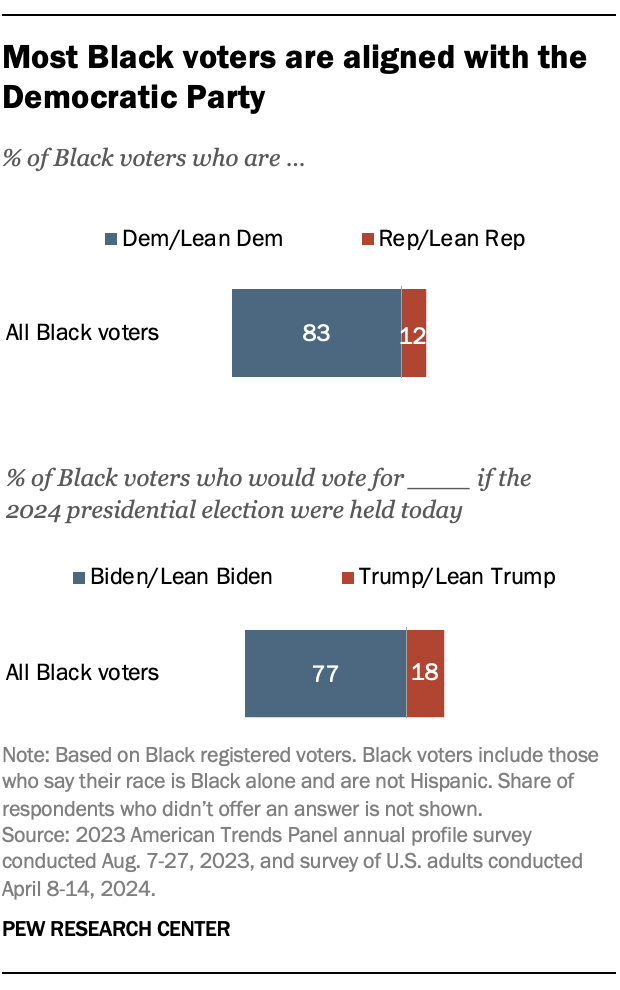
Today, American voters are about evenly split between the two major political coalitions, both in their partisan identification and in their presidential vote preference.
But Black voters remain largely aligned with the Democratic Party (83% identify with or lean to the Democrats), and 77% of Black registered voters say they would prefer to vote for Biden over Trump in the 2024 presidential election.
At the same time, Black voters are very critical of Trump. Most say he was a poor or terrible president (72%). And many Black adults think he broke the law in his alleged efforts to change the outcome of the 2020 election (65%).
Despite their support for Biden and criticism of Trump, about half of Black voters (49%) say they would replace both Biden and Trump with different candidates if they had the ability to decide. This is similar to the share of all voters who say this.
Black voters consistently align with the Democratic Party
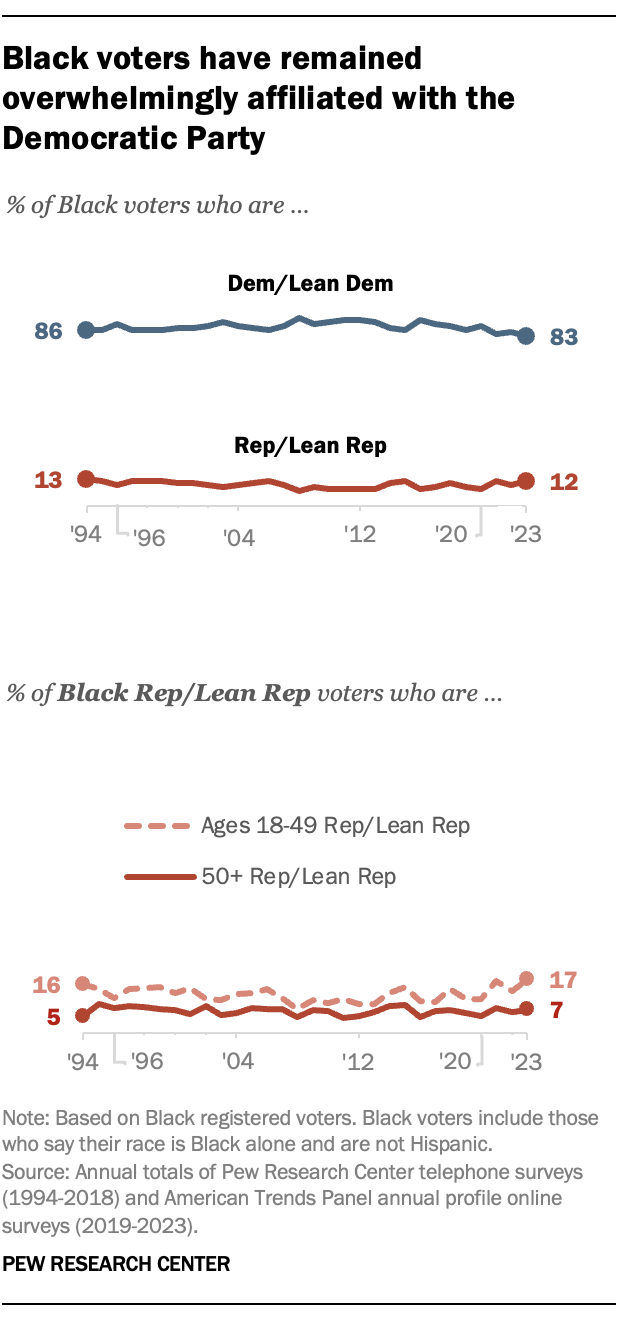
Currently, 83% of Black registered voters identify as or lean Democratic, while 12% are Republican or lean Republican. This share is slightly smaller than the 88% who associated with the Democratic Party in 2020. Still, the vast majority of Black voters have consistently identified with or leaned toward the Democratic Party over the last 30 years.
Similar shares of Black men (81%) and Black women (84%) are affiliated with or lean toward the Democratic Party. Roughly eight-in-ten or more Black men and women have consistently identified with or leaned toward the Democratic Party since 1994.
Although the majority of Black voters across education levels are Democrats, there has been a slight decrease in affiliation with the Democratic Party among those with college degrees in recent years. While 93% of Black voters with college degrees identified with or leaned toward the Democratic Party in 2012, that number had decreased to 85% in 2020 and then 79% in 2023.
Overall, older voters have tended to be more Republican than younger voters in recent decades, but this is not true for Black voters. While 7% of Black voters 50 and older currently identify as or lean Republican, 17% of Black voters under 50 are aligned with the Republican Party. This is not new, as younger Black voters have tended to be more Republican than older Black voters over the last 25 years.
Black voters prefer Biden in 2024 election, but some would replace both candidates
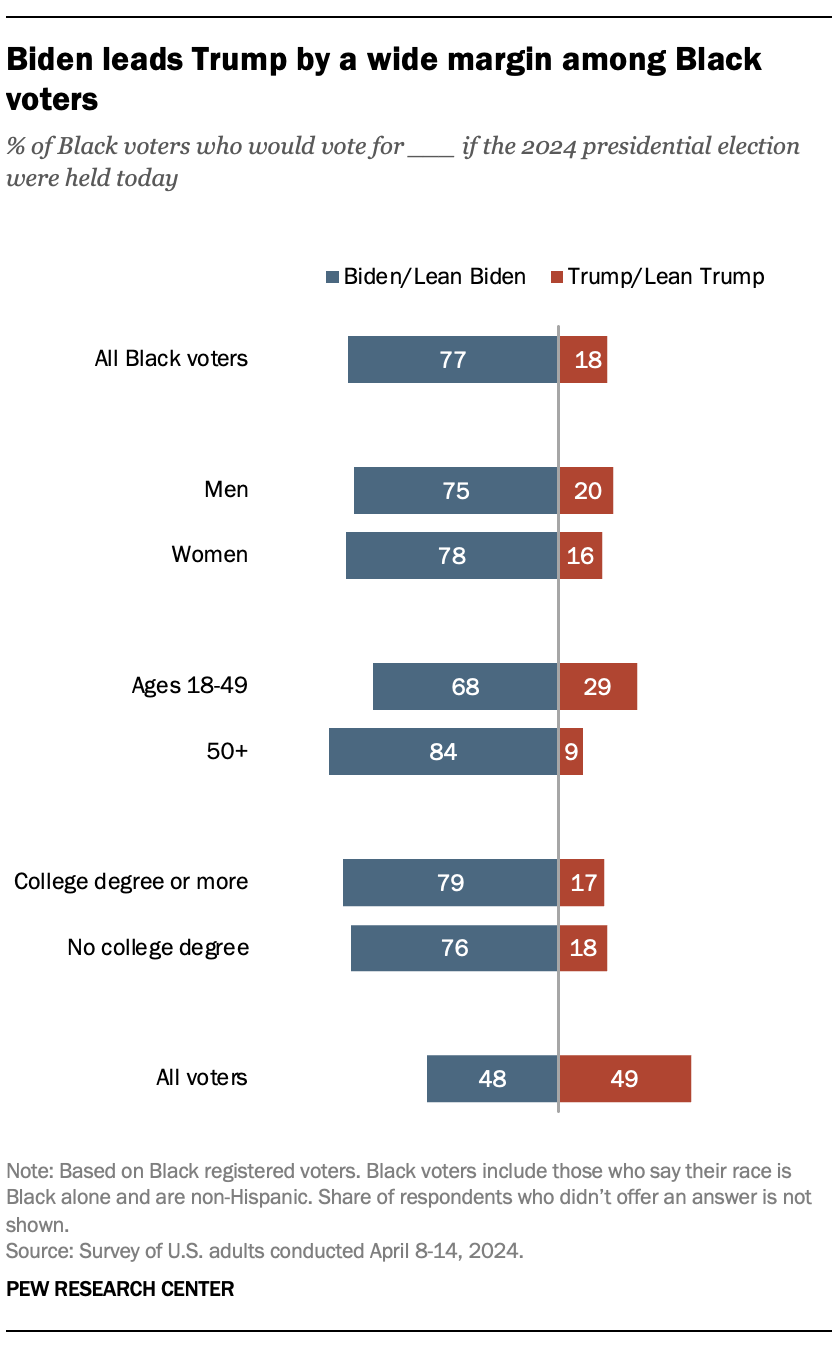
When it comes to the significance of the 2024 presidential election’s outcome, 55% of Black voters say it really matters who wins. Fewer say it does not matter (17%) or are somewhere in between (28%) in their views of the upcoming election’s importance.
Black voters’ preferences
As of April 2024, the majority of Black voters say they would vote for or lean toward Joe Biden (77%). Fewer say they would vote for or lean toward Donald Trump (18%).
Among all registered voters, 49% favor Trump while 48% support Biden.
The wide margin between Black voters’ preference for Democratic candidates over Republican candidates is nothing new. In 2016, there was an 85 percentage point difference in the share of Black voters who voted for Hilary Clinton (91%) over Trump (6%). And in 2020, Biden (92%) had a wide advantage over Trump (8%) among Black voters.
The current margin of support for Biden (59 points – 77% to 18%) is lower than it was in 2020 or for Hillary Clinton in 2016, according to Pew Research Center validated voter studies.
Younger Black voters are more likely than older Black voters to say they would vote for Trump. While about two-thirds of Black voters under 50 favor Biden (68%), 29% support Trump. Black voters 50 and older favor Biden by a wider margin (84% vs. 9%).
However, this pattern is reversed among all registered voters: Older voters are slightly more likely than younger voters to prefer Trump (51% vs. 46%), while younger voters prefer Biden (52% vs. 46%).
Many Black voters are dissatisfied with the Biden-Trump matchup
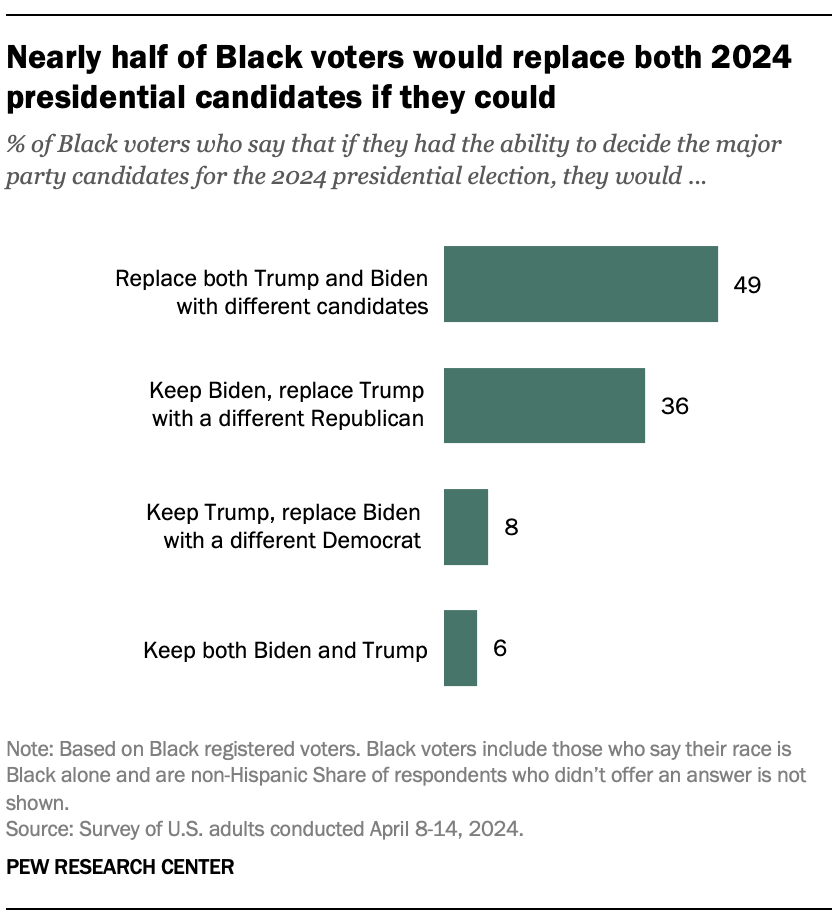
About half of Black voters (49%) say they would replace both Trump and Biden with different candidates if they had the ability to do so. An identical share of all registered voters say this.
Fewer Black voters say they would keep Biden and replace Trump with a different Republican (36%). Even fewer say they would keep Trump and replace Biden with a different Democrat (8%). And only 6% say they would keep both candidates.
Like the rest of U.S. voters, Black voters differ on this question by age and education. Younger Black voters (57%) are more likely than older voters (37%) to say both candidates should be replaced. And a larger share of older than younger Black voters say they would keep Biden and replace Trump (42% vs. 22%).
Nearly 60% of Black voters with a college degree say they would replace both candidates if they had the ability, while 45% of those without a degree say the same.
Black voters’ views on Biden and Trump as presidents
A majority of Black Americans (55%) approve of the way Joe Biden is handling his job as president.
This is a shift from a January 2024 Pew Research Center survey, when Black adults were evenly split in their ratings of Biden’s job performance (49% disapproved, 48% approved).
Biden’s ratings among Black Americans were far more positive earlier in his term. For instance, in a March 2021 Center survey, 87% approved of his job performance.
Despite shifts among Black Americans in their ratings of Biden, they are still more likely than other racial and ethnic groups and the U.S. public overall (35%) to approve of Biden’s job performance.
Black voters are more confident in Biden than Trump
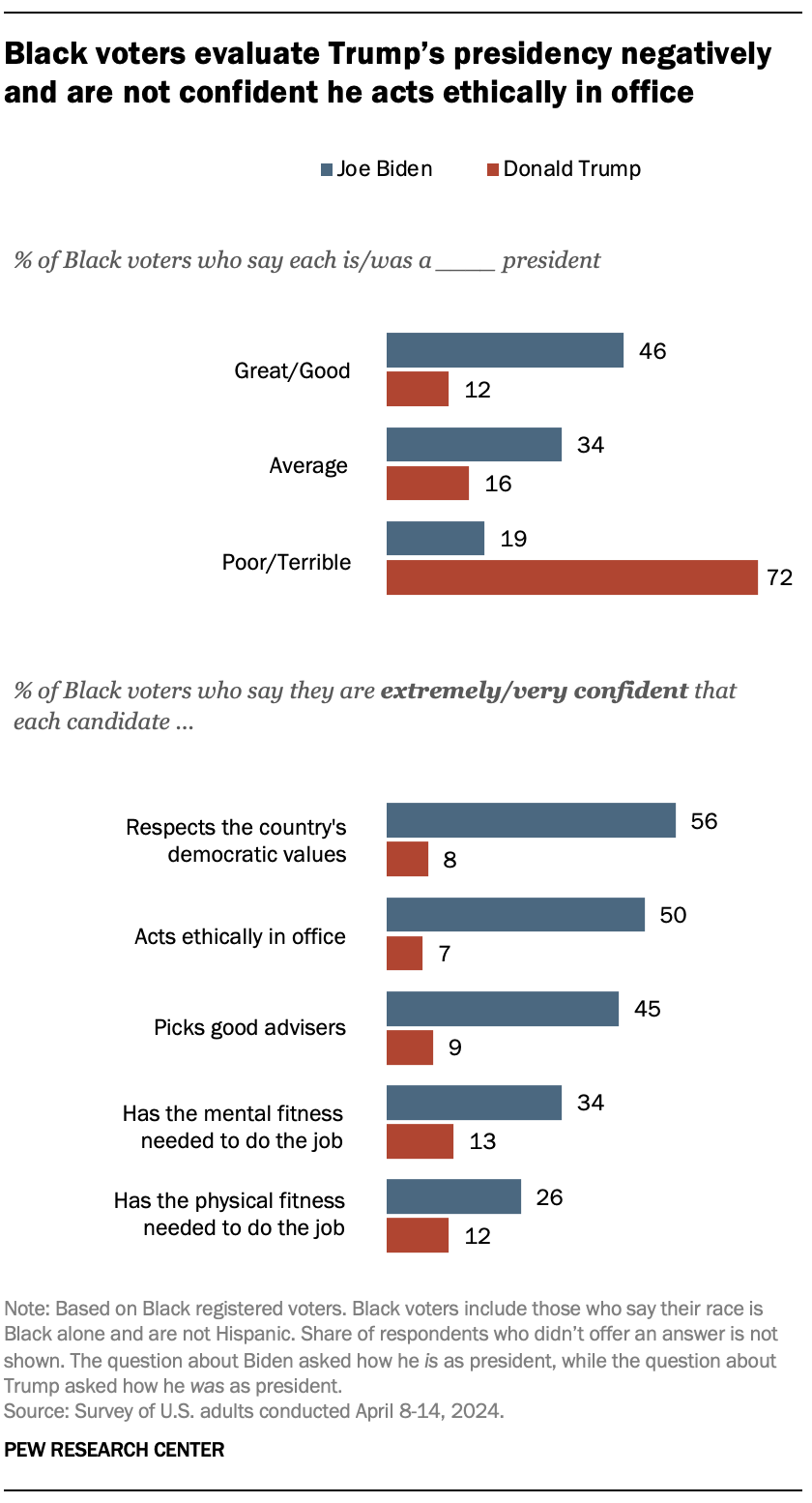
In further assessments of his presidency, 46% of Black voters say Biden is a great or good president. Far fewer say Trump was great or good during his time in office (12%). And a large majority of Black voters say Trump was a poor or terrible president (72%). Only 19% say the same about Biden.
Black voters are also much more confident that Biden has the qualities to effectively serve another term as president. A majority of Black voters (56%) are extremely or very confident that Biden respects the country’s democratic values, and half are confident that he acts ethically as president. No more than 8% of Black voters say Trump has either of these qualities.
Although most Black voters don’t express much confidence about the mental and physical fitness of either Trump or Biden, they are more confident in Biden. About a third of Black voters (34%) say Biden has the mental fitness needed to serve another term as president, and 26% say the same about his physical fitness. Only about one-in-ten say this about Trump.
Black voters are more likely than other racial and ethnic groups and the general public overall to say Biden has the mental and physical fitness to serve another term.
Trump’s election-related criminal charges
Beyond their critical views about Trump as president, the majority of Black Americans (65%) also believe he broke the law in an effort to change the outcome of the 2020 election. They are more likely than other racial and ethnic groups – and the U.S. public overall (45%) – to hold this view.
Black Americans’ policy priorities
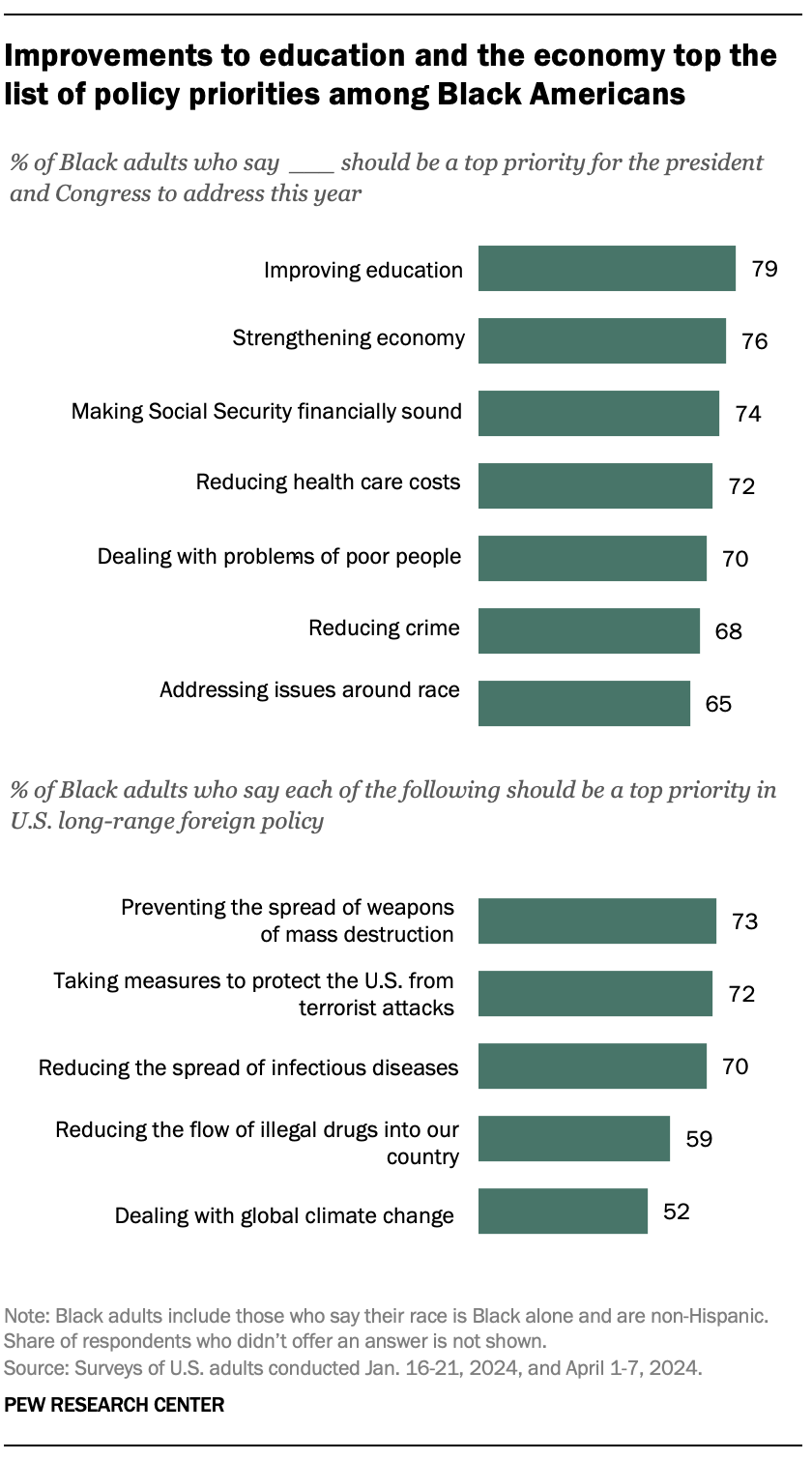
For Americans overall, the economy (73%) sits at the top of the list of policy priorities for the president and Congress in 2024.
However, for Black Americans, improving the education system (79%) and ensuring Social Security is financially sound (74%) are just as important as strengthening the economy (76%).
Clear majorities of Black Americans also say reducing health care costs (72%), dealing with the problems of poor people (70%), reducing crime (68%) and addressing issues around race (65%) should be top priorities.
Foreign policy priorities
When it comes to international issues, most Black Americans (82%) say it is more important for President Biden to focus on domestic policy than on foreign policy (13%). Most adults in the U.S. share this view, with 83% saying domestic policy is more important.
However, when it comes to long-range foreign policy goals, Black adults are more likely than the general public to say that preventing the spread of weapons of mass destruction (73% vs. 63%), reducing the spread of infectious diseases (70% vs. 52%) and dealing with global climate change (52% vs. 44%) should be top priorities.
CORRECTION (May 20, 2024): Due to an editorial error, a previous version of the report overstated the share of Black adults who say Trump broke the law in seeking to change the outcome of the 2020 election. It was 65%.

